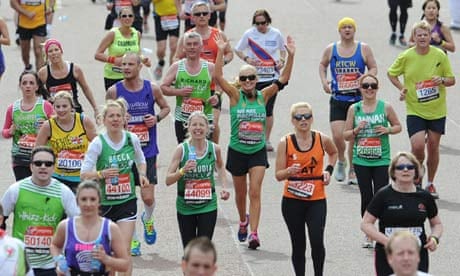The horror of the Boston Marathon bombings in which three people lost their lives, and many more sustained life-changing injuries, has focused attention on why anyone would choose to target so innocuous an event. It is certainly important to try to understand what motivates such behaviour. But important, too, not to overlook the immense motivational achievement completing a marathon represents for the thousands of individuals taking part.
Last month, 35,000 runners set off to run more than 26 miles to complete the London Marathon. It was a glorious day, cheering crowds lined the route, kids sat on shoulders waving balloons and the feeling was of mass celebration. But it also represented the culmination of months of training on cold wet mornings, aching quads and blistered feet, and sheer bloody-minded persistence.
Yet marathons have never been more popular. There's a new one starting up every week, or so it seems. There are 5ks and 10ks and half marathons and even "ultra" marathons, including the torturous Marathon des Sables, in which 300 competitors run more than 150 miles in six days across the Sahara, carrying all their provisions. When online registration opened for the 2014 race, all confirmed places had sold out within 11 minutes.
The obvious question is why do they do it. For the health benefits? It is questionable whether pushing the body to such extremes is doing it any long-term favours and it certainly isn't necessary; there are many far less punishing ways of keeping fit. For charity? Certainly sponsored runners raise a huge amount for good causes – last year's London Marathon raised more than £52m – and many people run on behalf of causes with which they have a personal connection. But I doubt whether, in most cases, raising money for charity was the instigating factor that led an individual to put on their first pair of running shoes.
I started running because I wanted to lose weight, and this seems to be a common enough reason. Running is a fabulous fat-burner and, provided you take it slowly and build up little by little, it's a very good way to get in shape and stay there. The problem is you do need to do it. And doing it is really rather painful at first; you need some motivation, a goal at which to shoot, so you enter a race, a 5k or 10k or, perhaps, if you're foolhardy enough, a half marathon. That's what I did this time last year, giving myself seven months to prepare. "You'll be super-fit by then," I told myself and a gratifying image flashed up in my mind, my head on Paula Radcliffe's body, flying around the 13-mile course.
I did do a bit of training, but then life got in the way and, most particularly, the Olympics; I was far too busy watching it to fit in the time to run. The race day came and I was probably still fatter and certainly no fitter than I had been when I entered. But somehow or other I hauled myself round and in doing so discovered something proper runners have known for a very long time. Running is more about mind than body, and that is one of its principal attractions.
Running is the most brilliant way of showing the mind who's boss. Your brain may be screaming at you to stop, telling you you can't keep going, you're not fit enough, you look pathetic, and still you just keep on running. For someone whose mind has been allowed to dictate rather too much of her life, this is a hugely liberating revelation.
I've joined a running club and run two or three times a week. While the physical benefits are clear, for me the mental ones still far outweigh them. I'm running the half-marathon again this October, raising money for Mind, the mental health charity. It seemed appropriate.

